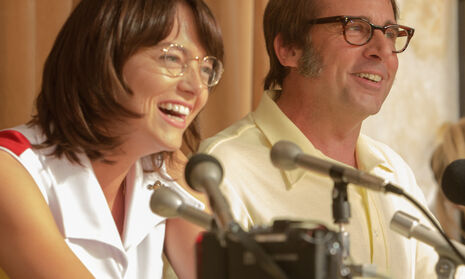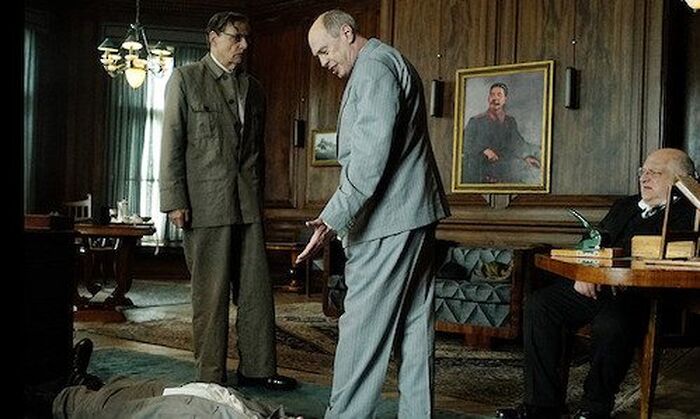Review: Battle of the Sexes serves love
The first film of the 37th annual Cambridge Film Festival is this highly-anticipated tennis biopic – certainly not a genre Lillian Crawford thought she would witness with a smile on her face and a tear in her eye

This is a film with a lot of balls. Works in the sports genre often have to – it takes a high level of skill to make the televisual truly cinematic. The final act of Battle of the Sexes delivers this with spectacular effectiveness, hooking its audience with every orgasmic gasp in the climactic match. None of its achievements would have been possible without the preceding hour-and-a-half, however, which is where the importance of this film lies. It is unlike anything seen before, and its meaning for LGBT+ cinema should not be understated.
“An heroic and empowering representation of women, far more than the populist twaddle in Wonder Woman”
Lesbian romances in film have started coming to the fore in cinema of late, albeit with often hideous sexualisation and gratuitously explicit intercourse. Carol was lauded for its approach to a romance between two women, but the extended shots of Rooney Mara’s breasts and its staunchly indie tone prevented the film from obtaining any wider appeal. If LGBT+ audiences want representation, it has to be in mainstream cinema where viewership is at its largest. It has to move beyond mere sexuality to deft and touching humanity – to love.
When Emma Stone last graced the silver screen with her dazzling presence, the world fell for La La Land and its heart-breaking romantic tale. She returns now, almost unrecognisably, as Billie-Jean King with a matured sensitivity, and the forbidden affair with Andrea Riseborough’s Marilyn is consistently beautiful, especially in the closeness of a stunningly sensual haircut scene. There is a striking awkwardness to their interactions, and while both Stone and Riseborough have already given remarkable performances this year, this may well be the pinnacle of their careers. What Battle of the Sexes does is it appeals to the same audience as any other Oscar-bait hit, but for the first time it dares to place a gay romance at its centre. And, shockingly, the world does not crash and burn.
The 12A age rating means that children as young as eight will be able to see this film, thus this will probably be one of the first predominant homosexual relationships a generation will watch in the cinema. It is also an heroic and empowering representation of women, far more so than any of the populist Amazonian twaddle seen earlier in Wonder Woman. The title itself takes gender equality as its target, and the constant anachronisms of 1970s political incorrectness will strike a nerve. Yet even in this context, King, along with her cohort, refuse to give in to the gasp-inducing male chauvinism on display. Steve Carell masters this, playing Bobby Riggs not merely as the outdated antagonist, but also as a man corrupted with whom the audience ultimately sympathises. While at first the dual biographical nature of the film may appear confused, both strands prove essential to the ultimate punch at the climax, and the emotional investment viewers have in it.
The rest of the ensemble support the key players superbly throughout. While the team’s fashion designer might at first seem unnecessary comic relief, and a potential detriment to the nuanced subtlety of homosexual representation, only Alan Cumming could maintain the perfect level of flamboyance to not do so. Indeed, in the film’s final moments, it is his movingly prophetic words that leave the film on a reflective note that resonates in the auditorium. Sarah Silverman also stands out for keeping not only the players, but also the plot in check when proceedings seem to drag. Their interactions provide necessary foreplay to the enthralling showstopper between Stone and Carell, and to the overall cohesive nature of the piece.
Following up Little Miss Sunshine with a tennis dual-biopic has proved directors Jonathan Dayton and Valerie Faris are filmmakers refusing to yet be defined, and they recreate 1970s America beautifully, complete with a delicate grainy filter. Nevertheless, they have undoubtedly made a film of the times – for all its apparent present anachronisms, the Battle of the Sexes, and sexualities, is far from over. Having served their first shot in the realm of mainstream representation, only time will tell who will be next to take up the racket and keep the ball flying
 News / Right-wing billionaire Peter Thiel gives ‘antichrist’ lecture in Cambridge6 February 2026
News / Right-wing billionaire Peter Thiel gives ‘antichrist’ lecture in Cambridge6 February 2026 News / Cambridge students uncover possible execution pit9 February 2026
News / Cambridge students uncover possible execution pit9 February 2026 News / Epstein contacted Cambridge academics about research funding6 February 2026
News / Epstein contacted Cambridge academics about research funding6 February 2026 News / Man pleads guility to arson at Catz8 February 2026
News / Man pleads guility to arson at Catz8 February 2026 News / John’s duped into £10m overspend6 February 2026
News / John’s duped into £10m overspend6 February 2026










